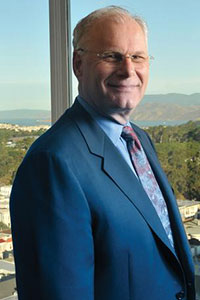Major Bay Area health pact could create new hospitals

Chris Rauber
Reporter- San Francisco Business Times
UCSF Medical Center, already engaged in a regionwide battle with Stanford Health Care, has significantly tightened its connections with John Muir Health.
The two hospital systems said late Monday they’re creating a jointly owned network “to provide patients with high-quality care at an affordable price.” They will also create a development company to build new medical facilities and increase the number of doctors in their network.
The new network includes a new health insurance arrangement under which they (and potentially other partners) take on limited insurance risk from the health plans they contract with.
The new enterprise would also help them provide physicians and patients with new tools “to improve the coordination of care” and improve patients’ experience.They signed a letter of intent to pursue the joint network last summer.
Under the agreement, however, both institutions — UCSF Medical Center, one of the nation’s leading academic medical centers, and John Muir, which operates hospitals in Walnut Creek and Concord — would remain independent.
Mark Laret, CEO of UCSF Medical Center and the UCSF Benioff Children’s Hospitals in San Francisco and Oakland, told me late Monday that the two partners “would like to grow our capacity in some areas to the east of John Muir,” and possibly elsewhere in the region. The new network might also “encourage more University of California employees to use UC or affiliated facilities,” Laret said.
In terms of timing, the partners hope to win regulatory approval to take on limited insurance risk in the region by the end of the year, Laret said. They’re also talking to “a wide number of physician groups and hospitals in the region about participating,” he added.
Under the new arrangement, UCSF Medical Center, John Muir and other providers would take on some insurance risk, while participating health plans would retain some. “We expect this to be a health plan-friendly network,” Cal Knight, John Muir’s president and CEO, told me in a Tuesday afternoon interview. “We want to partner with existing health plans.”
Other health players are eager to form federations to mimic that structure in the brave new world of Obamacare, where better coordination of care and elimination of waste and unneeded expenses are seen as crucial to success. Stanford and Sutter, in particular, have been making moves in the same direction. “They have to position themselves to compete with Kaiser, Sutter and Stanford,” said Walter Kopp, a longtime hospital and medical group consultant based in San Anselmo. “It’s a way of integrating clinically without merging. That’s a big trend.” Vivity, a partnership in Los Angeles linking some of that region’s largest and most influential hospitals, including UCLA Health, Cedars-Sinai Medical Center, Good Samaritan Hospital, Huntington Memorial Hospital, and several others, along with insurer Anthem Blue Cross, is an example, Kopp said. Muir has about 5,500 employees, not counting roughly 1,000 primary care and specialty physicians in its network. The agreement covers the so-called Bay Area Accountable Care Network, a regional network along the lines envisioned by President Barack Obama’s Affordable Care Act, better known as Obamacare. It also includes creation of the so-far unnamed development entity, to be owned equally, that will allow them to “develop joint initiatives” such as new medical centers, and a shared services organization to provides support services to doctors, including health information technology, billing services and other support. Ben Drew, a John Muir spokesman, said the nascent network ultimately will add “additional folks,” but that other would-be partners aren’t yet willing to be publicly identified. The two organizations plan to apply for a restricted Knox-Keene license from the state Department of Managed Health Care. Doing so will allow the new Bay Area Accountable Care Network to contract directly with health plans to “develop an insurance product” in which they and other providers take on some insurance risk. That moves them closer to Kaiser, but not all the way there, since they’ll be working with and through outside health insurers. Kaiser has always had its own health insurance component, and Sutter Health recently introduced its own Sutter Health Plus health plan in the Sacramento and Central Valley regions, and is beginning to move it into the Bay Area as well. UCSF Medical Center and John Muir also expect to coordinate their existing Epic electronic medical record systems and patient communication portals to enhance communications between doctors and patients. Integrating the records technology would also provide enhanced physician practice management services for Bay Area physicians who want to contract with the network — possibly in conjunction with other provider groups. [Source]: San Francisco Business Times


